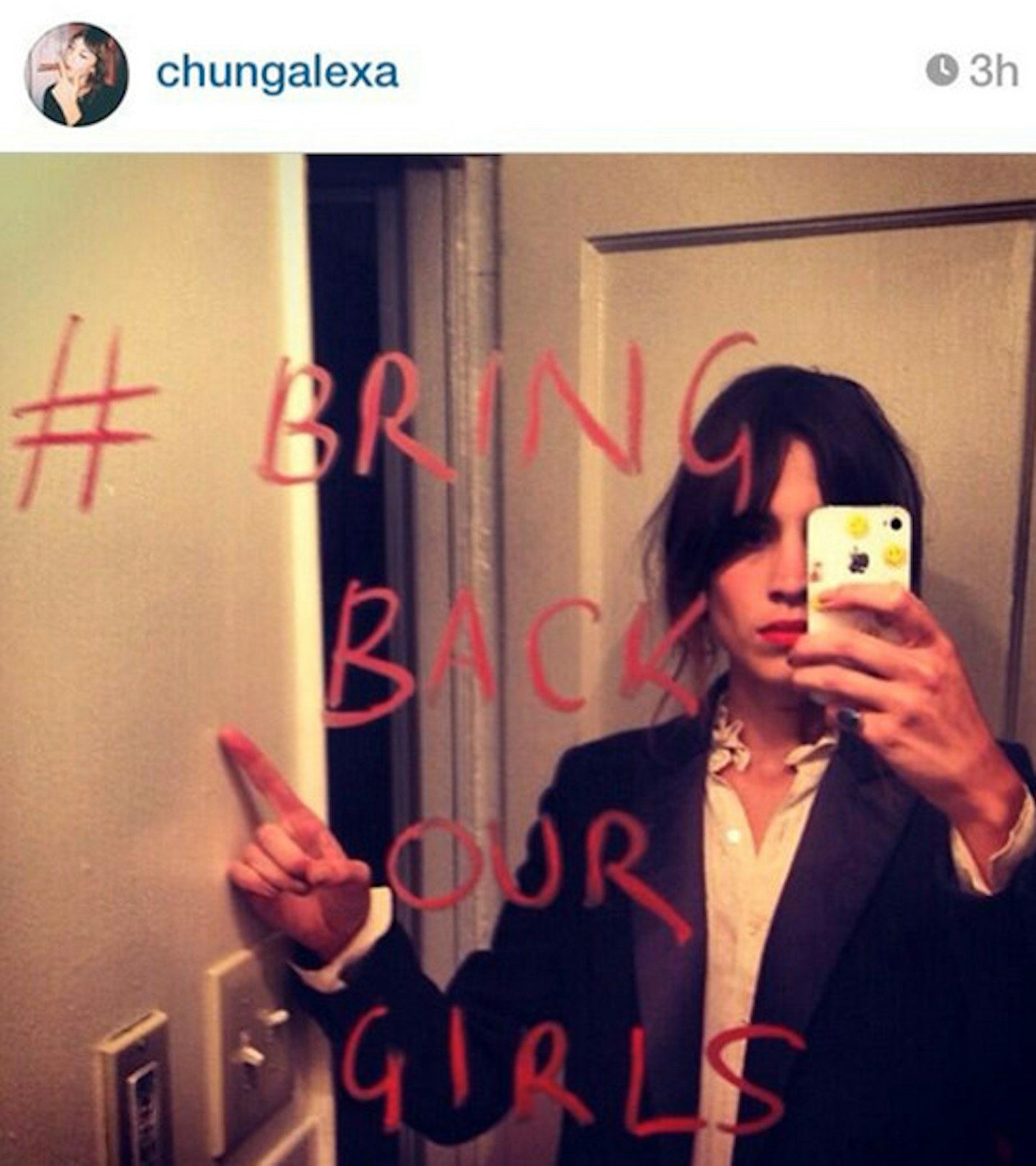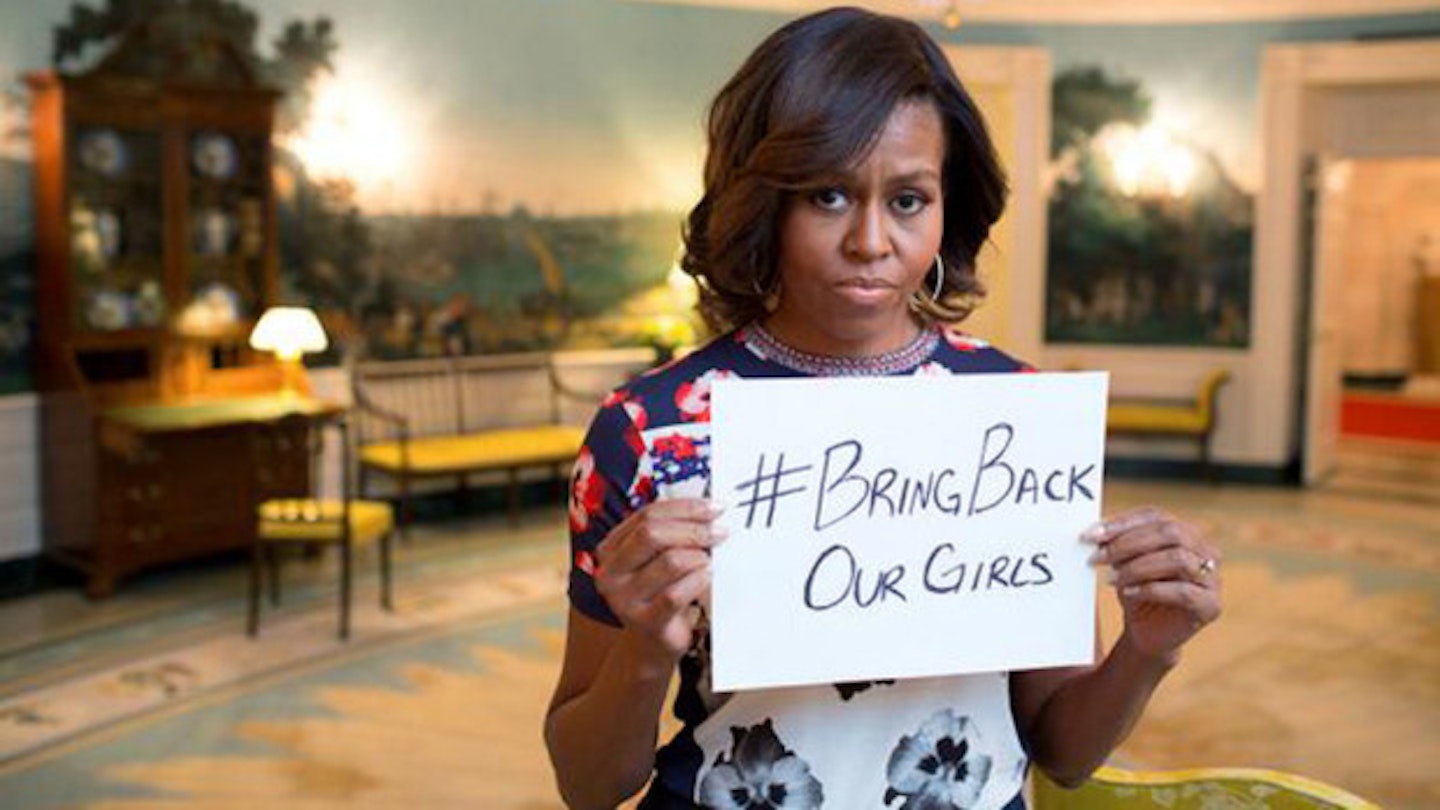The #BringBackOurGirls hashtag is gaining pace, with Michelle Obama, Malala Yousufzai and Alexa Chung all posting photos of themselves with the slogan. It’s all to draw awareness to the fact 200 Nigerian schoolgirls were kidnapped by terrorist group Boko Haram.
The girls, still missing after almost three weeks, were taken from their school in Chibok, north-east Nigeria, then driven off into the Sambisa forest by the militia, whose leader has since released a video, where he laughed and explained he would be selling the girls for £8. Boko Haram – a pro-Sharia group whose name means ‘Western education is sinful’ deliberately attacked a Christian school as they oppose girls’ rights to education.
The clicktivism has gained a lot of traction – Facebook and Twitter have been used to
Well, first and foremost, not to get too technical and media-y about it, but pictures of celebrities festoon our press, and to have this visual aid means the story can become a national talking topic, hopefully considered with a bit more prevalence than Katie Price’s third divorce.
Secondly, it’s a good way to build up pressure on governments to do something. Even if David Cameron simply jumps on the bandwagon and says something in a bid to be popular, it would still bring important international attention to the issue. It was only after the media reported on the issue – after it was placed as an issue of concern among voters – that the UK and US dedicated to send experts into the area to help get the girls back.
‘What’s remarkable about #BringBackOurGirls is that these efforts are not a result of a co-ordinated campaign by an international organisation, instead it’s a generation of young people who have used social media to get their message out,’ Brie Rogers Lowery, director of Change.org told The Debrief. ‘Using just their phones and laptops, they’ve made the world leaders stand up and pay attention.’
Thirdly, the attention the hashtag has got has led us to the first person to have tweeted the hashtag, Ibrahim M Abdullahi, a Nigerian lawyer, proving that it’s not as simple as assuming that people in Nigeria, particularly men in Nigeria, don’t give a crap about what’s happened.

Of course, the optimum way of solving this problem wouldn’t have come from the world’s youth, but from Nigeria’s president, Goodluck Jonathan. Silent for two weeks following the kidnap, things would certainly have been different if he had acted on the events while they were fresh.
He has now said: ‘I believe that the kidnap of these girls will be the beginning of the end of terror in Nigeria.’ (Boko Haram has been responsible for 3,000 deaths in the past three years) and a reward of 50m naira (£177,000) has been offered for the return of the girls.
But there was a point where the search had been called off, with families forced to go into the forest to try to rescue their girls. From this mass kidnap, only two people have been arrested: Saratu Angus Ndirpaya and Naomi Mutah Nyadar, two women protesting over the Nigerian government’s reluctance to do anything about the kidnap. The army was forced to retract a statement which said that they had rescued the girls, when actually they hadn’t.
Meanwhile, the Nigerian First Lady, Patience, called for a end to demonstrations. ‘Don’t use schoolchildren and women for demonstration again. Keep it to Borno, let it end there.’ She has also expressed doubts that the kidnapping even happened and accused protestors of belonging to Boko Haram. Seriously. When her words can be that damaging, it’s extra powerful for Michelle Obama – and other women admired around the world – to put pressure on those who can affect change and display a message of solidarity to the girls’ families, and to all the other girls in the world who are living under threat simply because extremists don’t believe in their right to an education.
Follow Sophie on Twitter @sophwilkinson
This article originally appeared on The Debrief.
